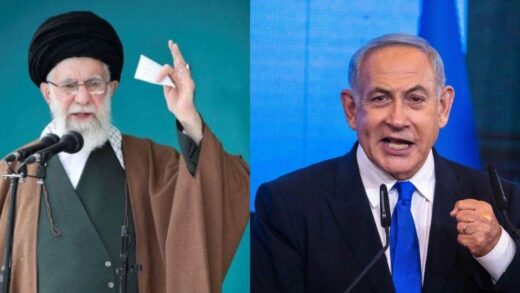UNITED NATIONS, Sep 17 (IPS) – Education Cannot Wait (ECW) has delivered quality education to children in crisis “against all odds,” ECW Executive Director Yasmine Sherif said at the United Nations today. “And you can imagine the odds. We are seeing more armed conflict, a growth of climate-induced disasters and the biggest refugee movement since World War 2.”
Education Cannot Wait’s ‘Results Against All Odds: 2023 Annual Results Report’ launched today (September 17, 2024) gives details of the dire need for additional funding because, while the number of children in urgent need of education support has nearly tripled since 2016, for the first time in a decade funding for funding for education in emergencies and protracted crises dropped.
The global community is falling behind on its promise to ensure ‘quality education for all’ by 2030, the report says, as armed conflicts, forced displacement, climate change, and other emergencies and protracted crises have left more than 224 million crisis-affected children in urgent need of education support, a sharp rise from 75 million in 2016.
Overall humanitarian funding for education decreased by 3% last year, from US$1.2 billion in 2022 to US$1.17 billion in 2023, according to the report.
Despite this, Education Cannot Wait (ECW), the global fund for education in emergencies and protracted crises within the United Nations, and its strategic partners continue to deliver life-saving, life-sustaining and multi-year investments in education to the world’s most vulnerable children and adolescents.
Sherif thanked ECW’s partners and the global community that supports education for children in crisis.
“Mostofall,wehavetothankthechildrenwhoareclingingontohopedespitethedarknessandtheoddsagainstthem,stillwantingtogotoschool,wantingtolearnandwantingtochangetheirlives.Now,despiteallthesealarmingtrendsandrealities,educationcannotwait,” Sherif said, noting that this report gave details of many children that had been reached sinceECWbecameoperationalin2017.
“That’ssixyears,11millionwithaholisticqualityeducation,aneducationthatischild-centeredandthatentitlestheentirespectrumofschoolmeansacademictraining,artsandmentalhealthandpsychosocialservices,protection,teachertrainingandteachersupport,amongstsomanyotherthings.” In 2023 alone, 5.6 million girls and boys were reached, she noted.
More Funding Needed to Meet 2026 Goal
To date, the fund has mobilized more than US$1.6 billion from public and private donors. However, US$600 million is urgently needed in donor contributions for ECW and its strategic partners to reach a total of 20 million children and adolescents with inclusive, quality education by the end of its 2023-2026 strategic plan period.
“For our 25 strategic donor partners, these transformative investments deliver a quality child-centered and holistic education, and thus represent a commitment to sustainable development, human rights, economic resilience and global security,” said Gordon Brown, UN Special Envoy for Global Education and Chair of ECW’s High-Level Steering Group.
“Education is the most powerful tool to restore hope in a world marred by brutal conflicts, human rights violations and inequality. It is our investment in a new generation of leaders.”
From Afghanistan, the Democratic Republic of Congo, Ethiopia, Gaza, the West Bank, to Haiti, the Sahel, Sudan, Ukraine and other hotspots around the globe, ECW’s report highlights the profound impact of education in crisis settings.
Funding Education: A Moral Choice
“Girls and boys in crises are enduring the worst impacts of brutal man-made conflicts, forced displacement, climate change and other disasters. Our new report proves that despite these challenges, it is possible to provide them with the protection, hope and life-changing opportunity of a quality holistic education. To do this, we urgently call for US$600 million to meet our strategic plan targets and ensure a better future for 20 million girls and boys by the end of 2026,” said ECW Executive Director Yasmine Sherif. “This is the time to make a moral choice that is aligned with political action.”
The new report shows ECW’s strong focus on the world’s most vulnerable and at-risk children: of the children reached in 2023, more than half were girls (51%), 17% were internally displaced and 22% were refugees.
The quality and impact of the education delivered—even in the most difficult of circumstances—are also improving. In all, 9 out of 10 programmes reported improved school enrollment and 72% showed gender-equitable progress. ECW reported that, among programmes able to monitor learning outcomes, 80% of its investments demonstrated academic improvements and 72% showed improvements in children’s social and emotional learning and well-being.
ECW investments also improved the continuity of learning, with notable increases in the number of girls and boys reached through the Fund’s investments in early childhood education and secondary school, disability inclusion, gender-transformative approaches, mental health support, and agile, holistic solutions that address whole-child needs.
The climate crisis is an education crisis. The number of children reached through First Emergency Responses resulting from climate-induced hazards nearly doubled from 14% in 2022 to 27% in 2023.
The report lays out ECW’s distinct approach and results in improving coordination at the humanitarian-development nexus, joint programming, increasing localization and community engagement, and building stronger data and evidence systems.
It demonstrates ECW’s efforts with partners to deliver on key United Nations initiatives and reforms, including the Grand Bargain agreement, the 2030 Agenda for Sustainable Development and the Secretary-General UN reform. The report shows that the systems are in place and that Education Cannot Wait has brought a revival through bold support to make the systems work at its best. But funding is required to achieve the goals.
“Education is a public good and a fundamental right. To achieve our goals, global leaders must align policies, funding and humanitarian principles. Multilateral aid funding must immediately be increased to reverse the current downward trend, and partnerships and collaboration must be strengthened across humanitarian, development and peace efforts. Education Cannot Wait has shown us that the seemingly ‘impossible’ is indeed possible—provided that the funding is made available,” said Brown.
IPS UN Bureau Report
Follow @IPSNewsUNBureau
Follow IPS News UN Bureau on Instagram
© Inter Press Service (2024) — All Rights ReservedOriginal source: Inter Press Service
Source link
#ECW #Delivers #Holistic #Education #Odds #Funding #Needed


















